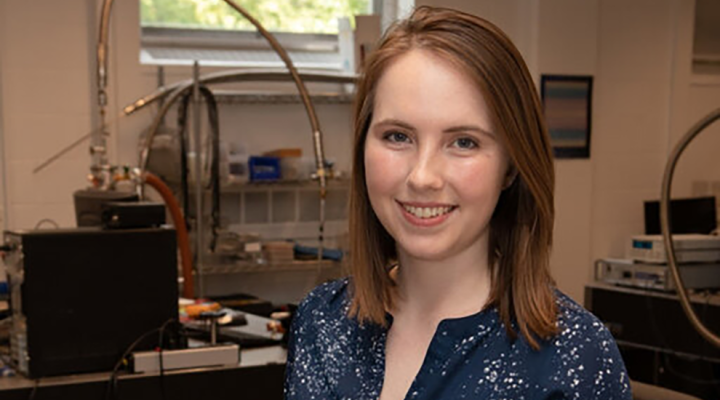
Advancing engineering education
Welcome new assistant professor Alexandra Werth. Read more about Advancing engineering education
The more researchers look closely at humans, the more they discover that we are not alone. In fact, we play host to an entire biome of commensal, symbiotic, and pathogenic microorganisms. The study of the complex interplay between us and our resident microbes is in its early stages.
Ilana Brito, assistant professor and Mong Family Sesquicentennial Faculty Fellow in Biomedical Engineering, is a trailblazer in this developing field. Brito, who joined the Nancy E. and Peter C. Meinig School of Biomedical Engineering (BME) at Cornell in July, 2016, uses systems biology approaches to study the transmission of bacterial and genetic components of the human microbiome.
Brito grew up on Long Island, where her mother was a civil engineer who maintained the control tower and all facilities at LaGuardia Airport. (Her elementary school classmates loved this because they got to take some great field trips.) Brito’s mother, a trailblazer in her own regard, was the only female civil engineer in her class. She has been a significant role model throughout Brito’s life, starting at that early age.
Brito describes herself as “someone who liked to collect things. I was always very science-y.” Brito majored in biology and political science (as a joint degree) at Harvard. “I like topics that bridge the divide between my two areas of study,” says Brito. “And I always want to be doing something that has direct impact in people’s lives.”
Brito took a year off of school during her undergraduate studies and traveled to Mali in West Africa. During her time in Mali, Brito did field and lab research as part of a Fogarty International Center and National Institutes of Health (NIH) project on malaria. “That was a pivotal year for me,” says Brito. “It shaped a lot of what I have done since.”
What Brito has done since is to earn a Ph.D. in genetics from MIT and then a postdoctoral research fellowship at the Earth Institute at Columbia University. “The Earth institute was great for me,” says Brito. “Their focus is on sustainability and their structure is fairly open-ended. They choose people they have confidence in and they give these people freedom to explore different fields.”
Brito took that freedom and ran with it. She turned her focus from pathogens to the organisms we live with. She created a project from scratch called the Fiji Community Microbiome Project. Brito traveled to small villages in the Pacific island nation of Fiji, where she surveyed 300 people about their family and social networks, their lifestyles, and their health histories to understand how bacteria that make up the microbiome are shared across families and friends. She collected microbiome samples from their body sites most exposed to exogenous bacteria, including the human GI tract. (Remember, Brito did describe herself as someone who liked to collect things.)
In this instance, there is a serious scientific purpose behind the collection. It is reasonable to think that daily exposure to microbes from the people and environment we are most exposed to would have an effect on the composition and function of our own microbiome. While reasonable to assume, this idea has not yet been addressed. Brito aims to answer some fundamental questions about the transmission of bacterial members of the human microbiome.
The questions she and her lab will tackle as she begins at Cornell BME are these:
The longer-term application of Brito’s basic research into genetic transmissibility within the human microbiome could include the engineering of microbial therapeutics and the delivery of genetic “cassettes” to the microbiome to enhance human health. Brito is thrilled to be at Cornell to do this work. “There are so many great schools at Cornell and the boundaries between fields are porous. As a researcher, this is a huge advantage.”